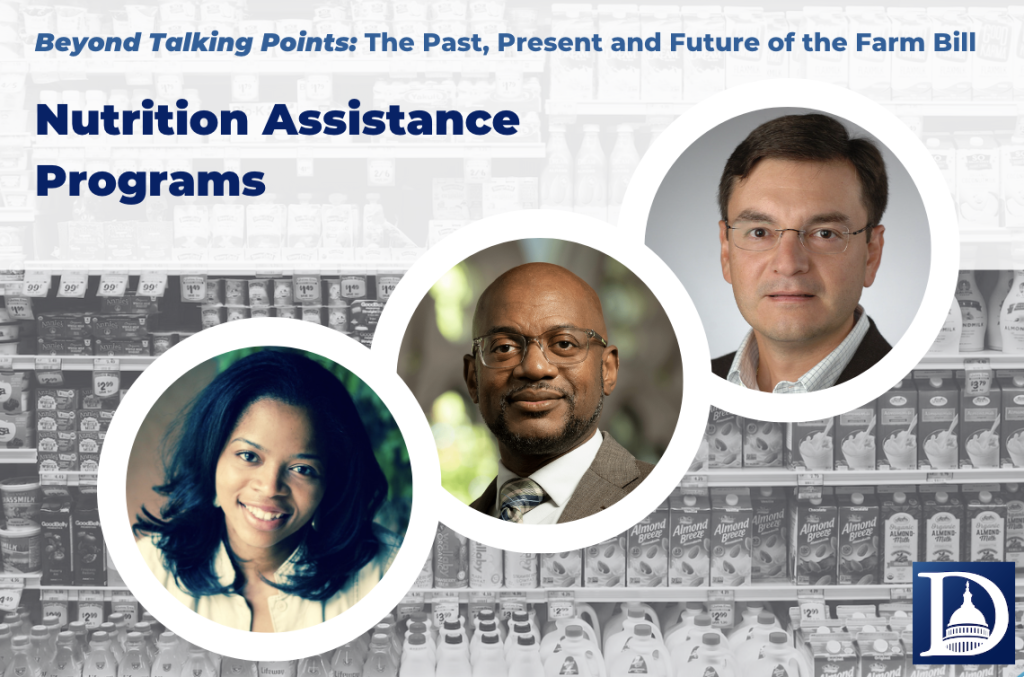
The Farm Bill, which is up for reauthorization this year, includes nutrition assistance programs, rural development, agricultural research and many other initiatives.
The Supplemental Nutrition Assistance Program (SNAP) comprised roughly 80% of the 2018 Farm Bill’s funding allocation. This year, this critical legislation is up for reauthorization in Congress and several experts from Duke University, along with a co-author from Syracuse University, shared insights from their research in the field and weighed in on potential changes to these programs to reduce the food insecurity and food resource gap between demographic groups. Watch the full conversation here and read the panelists’ excerpts below:
The 2023 Farm Bill Reauthorization Landscape and Recommendations to Policymakers
Norbert Wilson
“As we’re thinking about the current moment, we’re in and thinking about this, the current conversations around the debt ceiling, and then what’s going to roll into the Farm Bill in the coming months, this issue of eligibility is going to be an important conversation about who actually gets to participate, what are the rules that may shape this?”
Alfonso Flores-Lagunes
“By and large, SNAP is a public investment that generates large returns, particularly in the medium and long term… the disincentives to work generated by the program are, in general, at most, very small and lightly nonexistent… policymakers should try for SNAP to reach as many eligible households as possible given the high returns that the program has.”
Carolyn Barnes
“Given the long-run positive effects of SNAP on kids and, ultimately, adults, we should think about ways of simplifying the application and recertification process or in other words, we should reduce administrative burden in accessing nutrition assistance programs.”
Lessons learned from the pandemic
Carolyn Barnes
“The pandemic offered an opportunity to see what happens when we essentially eliminate the barriers to accessing these programs. SNAP was an essential buffer to economic hardship. We know that it was crucial for folks that were weathering potential food insecurity. But for the folks that couldn’t, couldn’t get access or for the more complicated, the complicated question of whether or not these burden-reducing strategies really had the impact they could have had.”
On inflation’s impact to SNAP and other nutritional assistance programs
Alfonso Flores-Lagunes
“We also need to take into consideration the extraordinary circumstances in terms of the world economy with the conflict in Ukraine, and so on, that limited the availability of grains and other products throughout the world… In general, I wouldn’t be overly concerned about inflationary pressures that having these additional snap resources for nourishing is going to create in the larger economy through inflation.”
Policy changes and administrative burden in the Farm Bill
Carolyn Barnes
“It expands the burden to a population that did not experience the burden before. There’s a whole new set of learning costs, learning what’s required of me (the recipient) now, that I that I’m no longer eligible in the way that I was prior to this change… and then the psychological cost of having to meet with the snap worker potentially, in whatever stigma or stress or complexity that might present itself that I otherwise would have forgone in the previous sort of iteration of the federal policy.”
“From the caseworker’s perspective, it’s again learning new policy and adapting to the new policy.”
How to support nonprofit workers who process SNAP applications and help people enroll in the program?
Carolyn Barnes
“I think outreach is critical and reducing some of those costs in advance of submitting the application would both increase the likelihood that someone has a successful claim for SNAP, and would also reduce the burden of the worker that’s trying to help someone enroll… A way to kind of shift gears and engage in sort of a grassroots communication strategy about what’s necessary to have a successful snap application? I think that could be a way to, to support workers.”
Norbert Wilson
“I’ve been in conversation with a person who’s involved in a local nonprofit, and this person has raised the challenge of navigating the rules and being able to help applicants through the process and and there was and because of the differences by state, there’s some variation that can occur, that it’s critical for nonprofits who are trying to help individuals to have a really detailed understanding of what the rules are to help people navigate that.”
Any parts of the application process or anything else within individuals’ interaction with the SNAP benefit that would be either most complicated or burdensome that might be able to benefit from policy changes?
Carolyn Barnes
“For both workers and participants, it’s documenting employment. What’s most burdensome for participants actually ends up being most burdensome for workers who are implementing the program and that’s gathering and confirming information… The second thing would be like household composition, which can be which can be tricky for low-income families.”
Final thoughts for Congress on reauthorization
Norbert Wilson
“An adjustment of the Thrifty Food Plan, which sets the maximum benefit level that then influences the benefit levels that everyone receives, is a critical factor in helping make sure the SNAP program really meets the food needs of families. And I would say the other part is anything that we can do that allows people to understand their ability to access the program and their ability to get the benefits.”
Carolyn Barnes
“Were at an all-time low in terms of poverty, but in general, relative to other developed countries, our safety net isn’t where it should be. And I think we could be far more generous.”
Carolyn Barnes is an assistant professor in the Duke University Sanford School of Public Policy
Norbert Wilson is a professor of food, economics, and community and serves as director of the Duke University Sanford World Food Policy Center
Alfonso Flores-Lagunes is a professor of economics at the Syracuse University Maxwell School of Citizenship and Public Affairs
